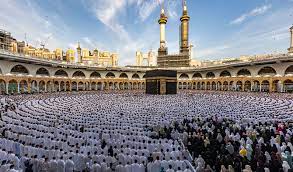
Narrated Urwa bin Az-Zubair:
I asked Aisha (whether the Prophet (ﷺ) had performed Umra in Rajab). She replied, “Allah’s Messenger (ﷺ) never performed any Umra in Rajab.”
Narrated Abu Huraira:
Allah’s Messenger (ﷺ) said, “(The performance of) `Umra is an expiation for the sins committed (between it and the previous one). And the reward of Hajj Mabrur (the one accepted by Allah) is nothing except Paradise.”
Narrated Qatada:
I asked Anas (about the Prophet’s Umra) and he replied, “The Prophet (ﷺ) performed `Umra when the pagans made him return, and Umra of al-Hudaibiya (the next year), and another `Umra in Dhi-l-Qa’da, and another Umra in combination with his Hajj.”
Narrated Ata:
I heard Ibn Abbas saying, “Allah’s Messenger (ﷺ) asked an Ansari woman (Ibn `Abbas named her but Ata’ forgot her name), ‘What prevented you from performing Hajj with us?’ She replied, ‘We have a camel and the father of so-and-so and his son (i.e. her husband and her son) rode it and left one camel for us to use for irrigation.’ He said (to her), ‘Perform `Umra when Ramadan comes, for Umra in Ramadan is equal to Hajj (in reward),’ or said something similar.”
Narrated Amr bin Aus:
Abdur-Rahman bin Abu Bakr told me that the Prophet (ﷺ) had ordered him to let Aisha ride behind him and to make her perform Umra from at-Tan`im
Narrated Al-Aswad:
That Aisha said, “O Allah’s Messenger (ﷺ)! The people are returning after performing the two Nusuks (i.e. Hajj and `Umra) but I am returning with one only?” He said, “Wait till you become clean from your menses and then go to at-Tan`im, assume Ihram (and after performing `Umra) join us at such-andsuch a place. But it (i.e. the reward if `Umra) is according to your expenses or the hardship (which you will undergo while performing it).
Narrated Ismail:
Abdullah bin Abu Aufa said: “Allah’s Messenger (ﷺ) performed Umra and we too performed Umra along with him. When he entered Mecca he performed the Tawaf (of Ka`ba) and we too performed it along with him, and then he came to the As-Safa and Al-Marwa (i.e. performed the Sai) and we also came to them along with him. We were shielding him from the people of Mecca lest they may hit him with an arrow.” A friend of his asked him (i.e. Abdullah bin Aufa), “Did the Prophet (ﷺ) enter the Ka`ba (during that Umra)?” He replied in the negative. Then he said, “What did he (the Prophet (ﷺ) ) say about Khadija?” He (Abdullah bin `Aufa) said, “(He said) ‘Give Khadija the good tidings that she will have a palace made of Qasab in Paradise and there will be neither noise nor any trouble in it.”
Narrated Ibn `Abbas:
When the Prophet (ﷺ) arrived at Mecca, some boys of the tribe of Bani Abdul Muttalib went to receive him, and the Prophet (ﷺ) made one of them ride in front of him and the other behind him.
Narrated Ibn `Umar:
Whenever Allah’s Messenger (ﷺ) left for Mecca, he used to pray in the mosque of Ash-Shajra, and when he returned (to Medina), he used to pray in the middle of the valley of Dhul-Hulaifa and used to pass the night there till morning.
Narrated Anas:
The Prophet (ﷺ) never returned to his family from a journey at night. He used to return either in the morning or in the afternoon.
Narrated Jabir:
The Prophet (ﷺ) forbade going to one’s family at night (on arrival from a journey).
Narrated Abu Huraira:
The Prophet (ﷺ) said, “Traveling is a kind of torture as it prevents one from eating, drinking and sleeping properly. So, when one’s needs are fulfilled, one should return quickly to one’s family.”